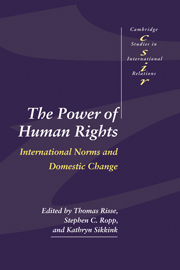Book contents
- Frontmatter
- Contents
- List of contributors
- Preface
- 1 The socialization of international human rights norms into domestic practices: introduction
- 2 Transnational activism and political change in Kenya and Uganda
- 3 The long and winding road: International norms and domestic political change in South Africa
- 4 Changing discourse: transnational advocacy networks in Tunisia and Morocco
- 5 Linking the unlinkable? International norms and nationalism in Indonesia and the Philippines
- 6 International norms and domestic politics in Chile and Guatemala
- 7 The Helsinki accords and political change in Eastern Europe
- 8 International human rights norms and domestic change: conclusions
- List of references
- Index
- Cambridge Cultural Social Studies
3 - The long and winding road: International norms and domestic political change in South Africa
Published online by Cambridge University Press: 07 December 2009
- Frontmatter
- Contents
- List of contributors
- Preface
- 1 The socialization of international human rights norms into domestic practices: introduction
- 2 Transnational activism and political change in Kenya and Uganda
- 3 The long and winding road: International norms and domestic political change in South Africa
- 4 Changing discourse: transnational advocacy networks in Tunisia and Morocco
- 5 Linking the unlinkable? International norms and nationalism in Indonesia and the Philippines
- 6 International norms and domestic politics in Chile and Guatemala
- 7 The Helsinki accords and political change in Eastern Europe
- 8 International human rights norms and domestic change: conclusions
- List of references
- Index
- Cambridge Cultural Social Studies
Summary
Introduction
South Africa's transition from the racial authoritarianism of the apartheid era to the non-racial democratic institutions and entrenched constitutional rights of the post-1994 period is widely regarded as one of the great human rights triumphs of the post-Second World War era. There is considerable truth in this perception. Moreover, the manner in which the struggle against apartheid was prosecuted does much to support the validity and relevance of the “spiral model” of human rights socialization and change proposed by Risse and Sikkink in the introductory chapter. From a very early stage, the struggle against apartheid was internationalized. Transnational principled issue networks composed of both state and non-state actors worked with South African opposition groups at home and in exile to bring pressure to bear, through international organizations, on the apartheid state. This pressure, combined with mounting domestic resistance, ultimately precipitated the abandonment of race-based minority rule and the subsequent adoption through negotiation of a political and constitutional order firmly rooted in international standards of human rights and liberal democracy. Indeed, given the early and prolonged nature of the international struggle against apartheid, I would go further: South Africa served as a vital precedent for the processes of transnational human rights activism and advancement explored in the other cases in this book.
Yet, in several important respects, the South African case challenges and extends the spiral model. While it adds to the cumulative understanding of how transnational activism can promote change in support of human rights norms, therefore, one must be cautious in treating South Africa as an archetype.
- Type
- Chapter
- Information
- The Power of Human RightsInternational Norms and Domestic Change, pp. 78 - 108Publisher: Cambridge University PressPrint publication year: 1999
- 15
- Cited by

